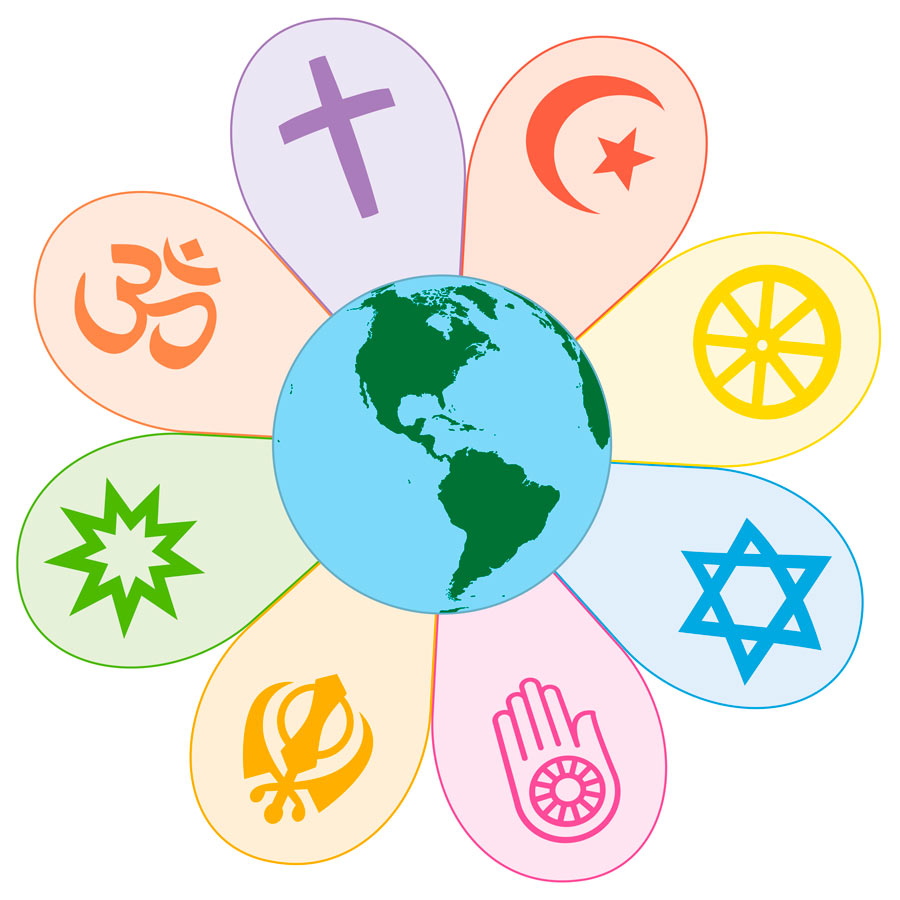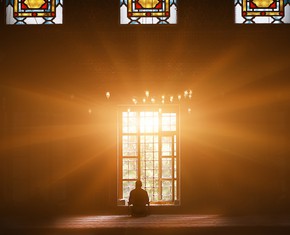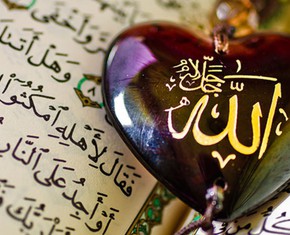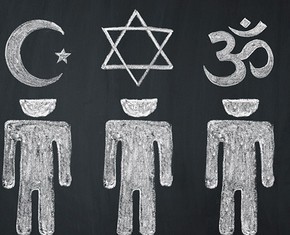The views expressed in our content reflect individual perspectives and do not represent the authoritative views of the Baha'i Faith.
Many different religious institutions claim to have exclusive access to the truth—but how could they all be right?
As a child, raised in a Protestant denomination that proclaimed its exclusive Christian truth, I asked that exact question. When my Lutheran minister said that only Lutherans possessed the real, true understanding of Christ; and my Catholic friend told me that his priest said exactly the same thing about the Catholic Church, it really confused me. So I asked my minister: “Why does our religion say it’s right, and all other religions are wrong?” I simply couldn’t understand how that could possibly make any sense.
My minister took me aside and went into a long, complicated story about the Papacy and the corruption of the Church in the Middle Ages and its departure from the true teachings of Christ and the advent of Martin Luther, some of which I understood and most of which I didn’t. (Hey, give me a break—I was 8.) Essentially, though, I did get the gist of his argument: “We’re right, and everyone else is wrong.” Oh. This didn’t seem possible, but as a child I tried hard to accept it.
The next time I saw my Catholic friend, I told him what my minister had said. Needless to say, he didn’t take it too well. In fact, he tried to slug me, and we stopped being friends that day.
Without knowing it at my young age, I had stumbled across the root cause of most religious disputes, disagreements and wars: exclusive claims to the truth. As I grew up, I started to see this same exclusivity manifest itself across all sorts of religious boundaries and among just about every sect, denomination and Faith I had ever encountered. It made me begin to actively dislike religion, because I saw how those exclusive truth claims drove wedges between people and divided them against each other.
Then, as a teenager, I decided to see if I could find a Faith that didn’t make any exclusive truth claims. I wondered if such a belief system even existed, but was determined to search for one.
 I spent quite a bit of time and energy investigating Zen Buddhism, Hinduism, and many other Eastern religions. They seemed to have a wider understanding and tolerance for other Faiths, but when it got right down to it even the Buddhists and Hindus claimed some exclusivity. “If someone doesn’t follow Buddha’s Eightfold Path,” a Buddhist friend told me, “they will repeat the cycle of suffering endlessly.”
I spent quite a bit of time and energy investigating Zen Buddhism, Hinduism, and many other Eastern religions. They seemed to have a wider understanding and tolerance for other Faiths, but when it got right down to it even the Buddhists and Hindus claimed some exclusivity. “If someone doesn’t follow Buddha’s Eightfold Path,” a Buddhist friend told me, “they will repeat the cycle of suffering endlessly.”
I looked into Judaism, and met wonderful souls, but that whole “God’s chosen people” teaching seemed pretty exclusive. I checked out Islam, but the mosques I visited struck me as exclusivist, too, especially with their emphasis on “people of the book,” which meant Islam only recognized the Abrahamic religions.
Then I looked into some of the more liberal Christian-based churches like the Unitarian-Universalists, and found that most of them didn’t make claims of exclusivity at all. This seemed promising. Most of the U-U’s I met had a broad, ecumenical understanding of faith, but the churches I attended also seemed to accept just about anything anyone wanted to believe, so that didn’t seem satisfying to me, either. I wanted an actual religion.
Also, I gradually realized, many of these denominations didn’t have much diversity. They seemed to attract the same kinds and classes of people, which frustrated me—I wanted to find a Faith that welcomed everyone, that had no exclusive claims and no exclusive membership policies, either.
So I decided, after several years of this ongoing search for inclusiveness, that I would just practice my own inner beliefs as I saw fit, accepting the beautiful spiritual teachings of all the traditions I had encountered and rejecting the ones I didn’t like. Ultimately, though, that path didn’t satisfy me very much, either, because it offered no community, no togetherness, no unity. Sure, we humans could all have our own individual beliefs, I discovered, but unless we could come together in a group setting, those lonely, individual, one-person religions couldn’t ever accomplish much or inspire much.
As I studied and tried to understand all of these traditions, though, something gradually dawned on me. The truth claims of all these various religions, as I examined them closely, turned out to be slight variations of larger, more universal truths. The more I looked, the more I found similarities and parallels in all of the faith traditions. There seemed to be a common set of principles and a common thread of spiritual truth in each one of the religions I had investigated. Sure, their practices and rituals differed, but at their core I found some of the same exact truths. I soon learned that this insight wasn’t mine alone, and that many people had already discovered it. Called perennialism, it recognized the over-arching commonality and congruity of all true spiritual teachings and traditions.
At that point I learned about the Baha’i Faith, and found what I had been looking for:
… “There are as many roads to God as the number of His creatures!”
A teacher must know these roads and strive to put himself in sympathetic touch with the weary pilgrims who are struggling along each road, and little by little teach them that what they call a road is not a road but an unbeaten hard trail leading to jungles and deserts and precipices. When they are prepared, he might then cry at the top of his voice: “O men! The Highway of the Lord of Hosts hath appeared. The Broad Boulevard of the Kingdom of God is paved. Lo! Behold!”
There are many people who have left their trails and are walking along this Celestial Path.
Do you not see them? Are you not learning by their example? Open your eyes! Look! Look! How many companies of people composed of ever so many nationalities are thronging the Golden Way of the Kingdom!
They are marching on and on, and with every step they take they come nearer to the goal. Their path is strewn with the lilies of love, and the hyacinths of affection. … and on their lips the songs of thanksgiving and anthems of glorification. Listen! Listen! Now they are singing in soft, harmonious murmur and anon raise their voices, flushed and inspired with rejoicing and happiness. Is it not better for thee, my brother, my sister, to leave thine own narrow trail over which is grown thorns of dogmas and under-brushes of creed and walk on this broad, brilliantly lighted Path of the Kingdom? Here thou wilt enjoy the companionship of spiritually minded men and women who have given up everything to serve their God and the world of humanity. This golden hour is slipping by; this divine opportunity is passing away. Avail thyself of it! – Abdu’l-Baha, Star of the West, Volume 4, p. 141.
The Baha’i Faith makes no claim of exclusivity, I learned. Instead, it teaches that all religions come from the same source and reflect the same essential spiritual truths. I had found my home.
You May Also Like
Comments

















Matthew 7:13-15
“You can enter God’s Kingdom only through the narrow gate. The highway to hell is broad, and its gate is wide for the many who choose that way. But ...the gateway to life is very narrow and the road is difficult, and only a few ever find it.
Beware of false prophets who come disguised as harmless sheep but are really vicious wolves.”
I say that statement is wrong, someone else says it's right; who is correct? Following the logic of the article, we both are! You can clearly see the errors in this way of thinking
I understand your perspective, and largely I agree with it. But it seems to me that Baha'is are often less than forthcoming concerning their true attitude toward the value and status of other religions. Also they are reluctant to acknowledge that, like all other religions, the Baha'i Faith manifests its own serious flaws when assessed according to Baha'u'llah's principle of honest "investigation of reality." I have found much to admire in the Baha'i Faith, but unfortunately I don't think it measures up to its very high claims for itself. I agree with you that ultimately ...each of us will answer to God alone for our faith and our actions in this world.
I think you are playing a bit with semantics in this series. Your view is no less a form of Baha'i triumphalism than is the superior self image of any other religion. The faith you've sincerely embraced has become for you "the Highway of the Lord of Hosts... the Broad Boulevard of the Kingdom of God... the Golden Way... the lighted Path of the Kingdom." Each of the other religious roads is seen as "an unbeaten hard trail leading to jungles, and deserts and precipices." You are certainly entitled to this opinion, but be honest ...with yourself - it is no different than the attitude of many other sincere religionists. And clearly adherents of the Baha'i Faith have their own jungles, deserts and precipices to navigate.
I think that's a possible topic for a future post
thanks you